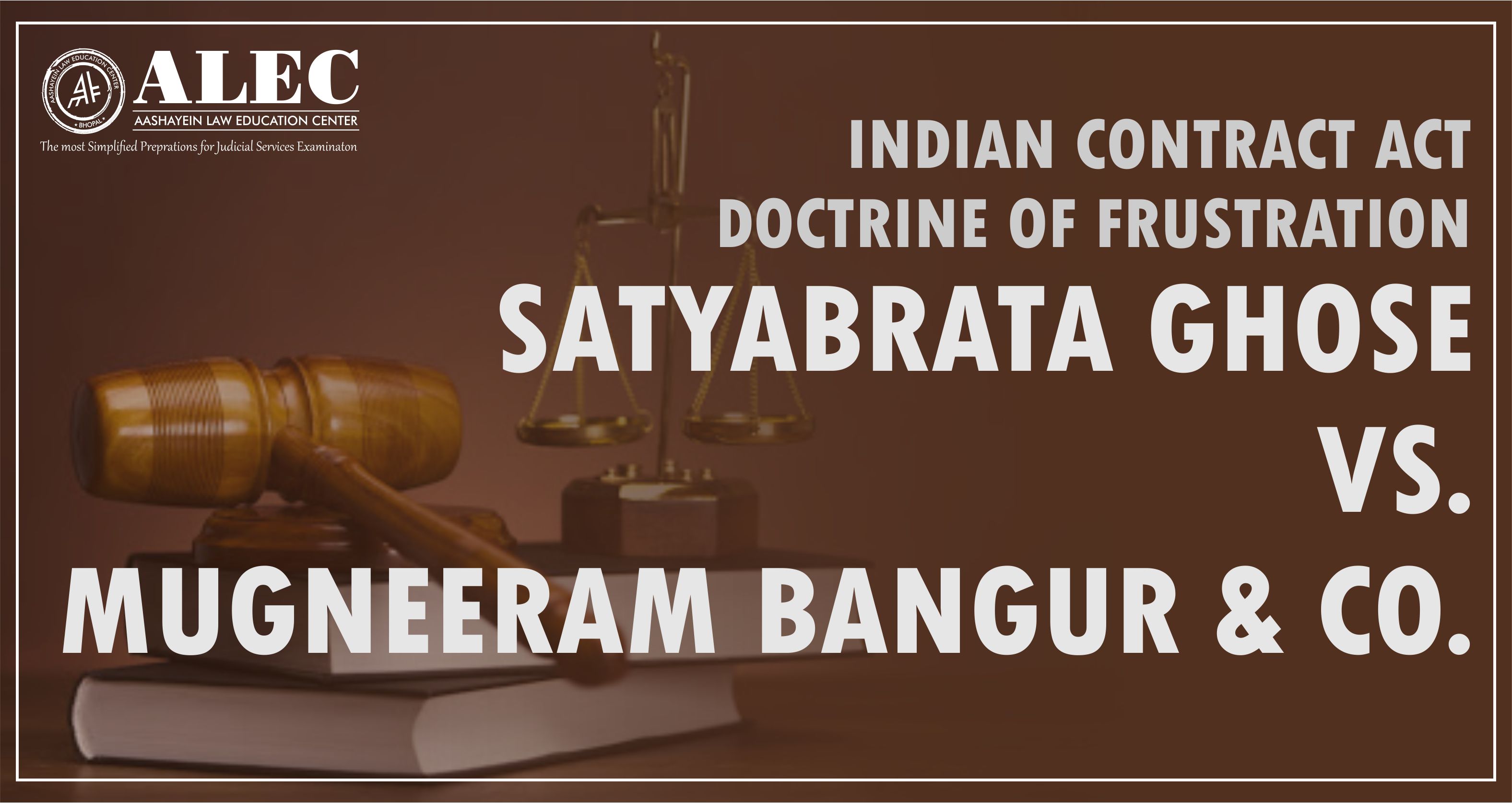SATYABRATA GHOSE
VS.
MUGNEERAM BANGUR & CO.
AIR 1954 SC 44
The Indian Contract Act, 1872 specifies the conditions under which the parties can be discharged of their contractual liabilities, one such condition is doctrine of frustration.
The doctrine of frustration is an English Common Law doctrine which has been incorporated under Section 56 of the Indian Contract Act, 1872 and hence given the statutory recognition. According to this doctrine, if the performance of a contract becomes impossible due to supervening impossibility then the promisor is excused from the performance of contract.
The following case is pioneer in deciding the nature and extent of impossibility which could discharge the parties from the performance of the contract.
Bench:-
Justice Mukherjee, B.K.
Facts:-
The Respondent's company owned a large tract of land in Calcutta. It started a scheme for the development of the land for residential purposes and divided land into different plots. The company entered into agreements with purchasers for the sale of the different plots and accepted a small amount of earnest money at the time of sale of land. The company undertook the job of constructing roads and drains, necessary for the residential purposes. The plots would be given after the construction and payment of balance amount by the buyers. Bejoy Krishna Roy entered into the agreement with the company and paid the earnest money deposit of Rs. 101. Later, he made Satyabrata Ghose as the nominee of the land.
The agreement was entered during the war time and subject matter of contract i.e. the land was requisitioned for military purposes. As a consequence, the company treated the agreement as cancelled on the grounds of impossibility and offered the repayment of earnest money or continuation of construction work after the termination of war. The appellant refused both the options and filed the suit.
You can also read the Blog by visiting [Blog]
For more information, visit [Aashayein Enquiry Section]
Issues:-
- Whether the contract becomes frustrated under the Section 56 of ICA?
- Whether the English law of frustration apply in India?
Judgment:-
The Court held that the term 'impossibility' should not be interpreted literally. Its interpretation should be that the supervening events should be of such a nature that it destroys the very foundation of the agreement. In this case, parties were aware of the existing conditions of war, furthermore no specific time was specified for completion of contract, therefore, the contract was not frustrated under Section 56 of the Indian Contract Act, 1872.
Analysis:-
The Section 56 of the Indian Contract Act, 1872 states that the contract to do an impossible act is void and it further states that a contract which afterwards becomes impossible due to the events which promisor could not prevent renders the contract void and eventually discharges the parties from the liabilities. However, the term impossible has not been defined under the Act.
The Supreme Court of India in the present case explained the doctrine of frustration and decided the nature and extent of the term "impossibility". The Court said "the essential idea upon which the doctrine of frustration is based is that of 'impossibility of performance of the contract.' In fact, impossibility and frustration are often used as interchangeable expressions. The changed circumstances make the performance of contract impossible and the parties are absolved from the future performance of it, as they did not promise to perform impossibility. The doctrine of frustration is really an aspect or part of law of discharge of contract by reason of supervening impossibility or illegality of the act agreed to be done and hence comes within the purview of Section 56 of the Indian Contract Act, 1872." In other words, the Court said the 'impossibility of performance' should not be interpreted literally i.e. impossible to perform as it might include events like strike, commercial hardships etc.; rather the term impossibility should be a given a wider meaning and shall include events of such a nature which destroys the very foundation of the agreement. The impossibility should be of such a nature that it renders the contract 'impracticable' and even though if performed, it would be substantially 'useless' in view of its object and purpose.
In the present case, the Court denied to apply Section 56 to the case due to following reasons:
- Firstly, the contract was entered during the war times so parties had the knowledge of ongoing situations.
- Secondly, the contract did not specify any time of performance so during war times it is logical that the performance of contract could be delayed.
Therefore, the court broaden the concept of 'impossibility' and protected the interest of promisee as the promisor was disabled to use the defence of "doctrine of frustration" according to his whims and fancies so to be discharge of liabilities.

